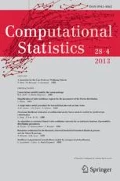Abstract
This work presents a new scheme to obtain the prior distribution parameters in the framework of Rufo et al. (Comput Stat 21:621–637, 2006). Firstly, an analytical expression of the proposed Kullback–Leibler divergence is derived for each distribution in the considered family. Therefore, no previous simulation technique is needed to estimate integrals and thus, the error related to this procedure is avoided. Secondly, a global optimization algorithm based on interval arithmetic is applied to obtain the prior parameters from the derived expression. The main advantage by using this approach is that all solutions are found and rightly bounded. Finally, an application comparing this strategy with the previous one illustrates the proposal.
References
Apostol TM (1967) One-variable calculus, with an introduction to linear algebra. Wiley, New York
Consonni G, Veronese P (1992) Conjugate priors for exponential families having quadratic variance functions. J Am Stat Assoc 87(420): 1123–1127
Gutiérrez-Peña E, Mendoza M (1999) A note on Bayes estimates for exponential families. Rev R Acad Cienc Exact Fís Nat Esp 93: 351–356
Gutiérrez-Peña E, Smith AFM (1997) Exponential and Bayesian conjugate families: review and extensions (with discussion). Test 6: 1–90
Hansen E, Walster GW (2004) Global optimization using interval analysis. Dekker, New York
Hargreaves GI (2002) Interval analysis in MATLAB. Tech. Rep. 416, Department of Mathematics, University of Manchester
Johnson NL, Kotz S, Balakrishnan N (1995) Continuous univariate distributions, vol 2. Wiley, New York
Moore RE (1966) Interval analysis. Prentice Hall, New York
Morris CN (1982) Natural exponential families with quadratic variance functions. Ann Stat 10: 65–80
Morris CN (1983) Natural exponential families with quadratic variance functions: statistical theory. Ann Stat 11: 515–529
Pál L, Csendes T (2009) INTLAB implementation of an interval global optimization algorithm. Optim Methods Softw 24: 749–759
Rufo MJ, Martín J, Pérez CJ (2006) Bayesian analysis of finite mixture models of distributions from exponential families. Comput Stat 21: 621–637
Rufo MJ, Pérez CJ, Martín J (2009) Local parametric sensitivity for mixture models of lifetime distributions. Reliab Eng Syst Saf 94(7): 1238–1244
Slate EH (1994) Parameterizations for natural exponential families with quadratic variance functions. J Am Stat Assoc Theory Methods 89(428): 1471–1482
Student in the Statistics Community (1906) On the error of counting with a haemocytometer. Biometrika 5: 351–360
Wolpert RL (2002) The gamma function. In: El-Shaarawi AH, Piegorsch WW (eds) Encyclopedia of environmetric, vol 2. Wiley, New York, pp 837–839
Author information
Authors and Affiliations
Corresponding author
Rights and permissions
About this article
Cite this article
Rufo, M.J., Martín, J. & Pérez, C.J. A note on the prior parameter choice in finite mixture models of distributions from exponential families. Comput Stat 25, 537–550 (2010). https://doi.org/10.1007/s00180-010-0188-2
Received:
Accepted:
Published:
Issue Date:
DOI: https://doi.org/10.1007/s00180-010-0188-2

